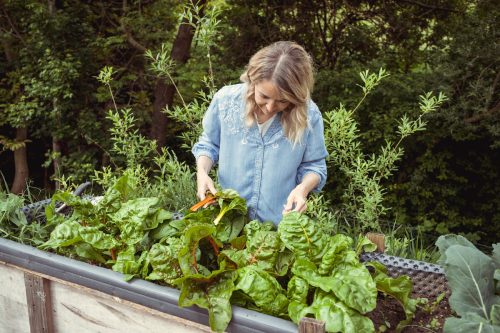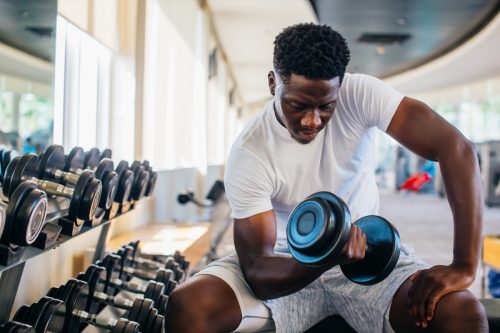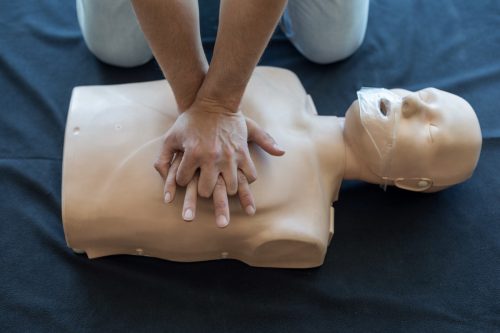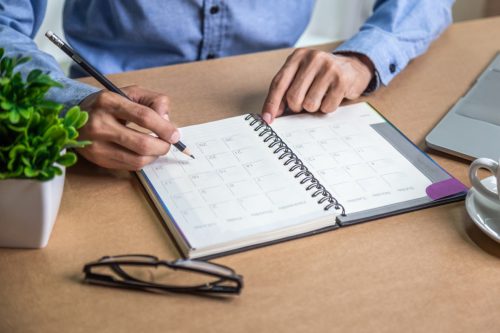40 Life Skills Everyone Over 40 Should Know
Can you change a tire? Are you confident speaking in public?
Let's be clear: You needn't be a licensed mechanic to fix a broken-down car. You don't need to be a trained chef to cook a delicious meal, either. And you don't have to be a standup comedian to tell a funny story. There are certain life skills you should have to be considered a well-rounded, knowledgeable, and dependable person—especially once you're on the cusp of middle age. That's why we spoke to life coaches and therapists to find out the 40 essential life skills everyone over 40 should know. Keep reading for all the tips.
READ THIS NEXT: 40 Incredible Ways Your Body Changes After 40.
40 Life Skills Everyone Over 40 Should Know
1. Mindfulness

"After the age of 40, we officially enter into a lifespan development stage called 'middle adulthood,'" explains Shawn Li, a psychotherapist-in-training at ReEnvision Marriage and Family Therapy. "It's a stage filled with many adjustments, excitement, and a lot of grief. We're witnessing both the old fade away and the new coming in."
Therefore, it can be more important than ever to be able to manage stress with a mindfulness practice such as progressive muscle relaxation, deep breathing exercises, or meditation, says Rakish Rana, life coach and founder of The Clear Coach. "These techniques encourage emotional strength and well-being, make it easier for you to deal with difficulties, and lead to a more balanced and satisfying life."
2. Cooking healthy meals

Those nights of 25-cent ramen noodles should be little more than a distant memory by the time you're in your 40s.
"Eating well and eating for nourishment becomes even more important as we age," notes Li. "There's a strong correlation between our nutritional quality and physiological health, impacting our mental health. Knowing your basics around the kitchen will set the groundwork for a healthy 40s and beyond."
3. Preparing a signature dish

For the day-to-day, easy and healthy meals are great, but for special occasions, you'll want to have a signature dish you can prepare without much hassle.
Samantha Hoff, mindful yogi, DIY lifestyle expert, sustainable designer, and founder of Pottery with a Purpose (PWAP), says this dish should be something you can serve when hosting guests or that you can bring to a potluck.
4. Making at-home cocktails and mocktails

Put that bar cart to use, says Hoff. "Enjoying delicious drinks doesn't have to be reserved for nights out if you learn a few simple cocktail-making skills."
By the time your 40s roll around, know how to muddle mint for a mojito, shake a martini, or pour a not-too-bubbly French 75.
This comes in handy when you're having guests over and they'd like something other than wine or beer. And be sure to learn the mocktail versions, too.
5. Table manners

Sure, you probably know not to chew with your mouth open or put your elbows on the table, but there's a lot more that goes into good table manners—and you don't want to be the odd one out at a dinner party.
As Best Life previously explained, this includes putting your napkin on your lap as soon as you sit, not sipping your drink until the host makes a toast, knowing the correct utensils for each course, and avoiding reaching across the table.
READ THIS NEXT: 5 Polite Ways to Get Your Guests to Leave, Experts Say.
6. Hosting etiquette

Whether it's just for cocktails or you're having weekend visitors, there are some simple "unspoken rules" that you should be following when hosting guests.
As Best Life previously outlined, this includes spending equal time with all guests, asking about dietary restrictions in advance, and having extra essentials out in places like the bathroom.
7. Recycling

Just because you have a bin for plastic and glass and another for paper doesn't mean you're recycling correctly—and by the time you're 40, you'll want to get this "sorted" out.
According to the Environmental Protection Agency (EPA), local counties and municipalities have different recycling rules, and certain items—such as bottle caps and egg cartons—may not actually be recyclable.
8. Engaging in a hobby

"There are so many amazing things outside of work to do," Hoff says, which is why she advises people over 40 to find a hobby they love.
"Try yoga, gardening, or pottery! Anything that brings you joy and that makes your me-time meaningful," she suggests. "If you're having trouble finding something to try, think back to what you enjoyed during your childhood."
9. Getting your steps in

The digital age has left far too many of us sitting all day, which, as Best Life reported, can lead to health complications such as muscle stiffness, increased risk for heart attacks and strokes, circulation issues, back pain, and weight gain, among others.
Once you hit your 40s, you'll want to have a plan for getting your steps in to ward off these problems.
And though the rise of fitness trackers created conventional wisdom that we need 10,000 steps a day, a 2019 study published in JAMA Internal Medicine found that women, specifically, who took 4,400 steps a day had a 41 percent lower mortality rate than those who took 2,700.
10. Having an exercise routine

As mentioned, not moving can lead to a host of health problems. But the best way to ensure you'll lace up those sneakers is to have an exercise routine that you actually enjoy. And by your 40s, hopefully, you know what this is, whether it's running, practicing yoga, strength training, or taking long walks.
"When individuals are in their 40s, it can be common to lose muscle mass, and it can be more challenging to preserve lean muscle mass," Kelli Fierras, head trainer at EverybodyFights, previously explained to Best Life. "That's why it's important to plan a consistent exercise regimen that works for you. Write down your plan as if you were planning for your work week."
READ THIS NEXT: 5 Medical Tests Everyone Over 40 Needs to Schedule Right Now.
11. Budgeting

With any luck, you've already got some cushion in your savings by the time you hit 40. However, regardless of whether you've been maxing out your IRA contributions for years or are still trying to pay off your student loans, it's essential that you know how to budget by the time your 40s roll around.
Life coach and author Felicity Nicole suggests downloading budget-friendly worksheets. "Take your monthly income and your debt ratio and create a budget." She also recommends watching content about budgeting on YouTube or even TikTok.
12. Investing

If you want to eventually retire—and who doesn't?—knowing how to invest your money is a great first step. Investing now, whether you're personally managing your portfolio or have hired an advisor to do it for you, will serve you well in the long run, helping you maximize your money and leaving you a healthy amount of cash for when you're ready to stop working.
"Understand your income, your expenses, your investments… Know your credit score, understand your insurance policies," advises Laura Wasser, a relationship expert, divorce lawyer, and chief of divorce evolution at Divorce.com. "All these pieces of information are necessary to make sound financial decisions."
"What about life insurance? If so, how much?" adds Nicole. "Do you have a 401k and are you sitting tight with the market, or are you still young enough to throw some money and get risky?"
13. Doing your taxes

Hiring an accountant to do your taxes can be costly, which is why learning to do it yourself by the time you're 40 can save you a lot over the years.
"Filling out your taxes can take you a step further in being independent as you don't have to be at the beck and call of lawyers and financial experts asking for various documents over and over again to get it done on time," notes Peter Zendzian, president of cyber security company ZZ Servers.
And even if you must hire outside help, it's still important to understand the basics of tax filing so you can ensure everything is correct.
14. Tech-savviness

If you're over 40, you didn't grow up with laptops and smartphones. And if you're still not super comfortable with this technology, now's the time to get up to speed.
"Learn how to video call your grandkids, use a fitness app, manage your bank account online," suggests Wasser. "Embracing technology can make life so much easier, trust me."
15. Sewing

By this point in life, odds are you've assembled more than a few wardrobe pieces worth a little bit of money—or at least a lot of sentimental value. If you're eager to preserve them—without accruing pricey tailor bills—it's time to learn how to properly mend your garments, from picking up dropped hems to sewing on missing buttons.
But more than the practical aspects of sewing, a 2019 study published in the Clothing and Textiles Research Journal found that women, specifically, were motivated to sew mostly for personal fulfillment. In fact, the study found that, at the time, people from 20 percent of U.S. households knew how to sew.
READ THIS NEXT: 50 Clever Home Upgrades That Will Instantly Add Resale Value.
16. Painting a room

You might be inclined to hire someone to paint the walls in your home, but Nicole says this is a life skill that'll both save you money and have you feeling accomplished.
"Make it a weekend project," she suggests. "Taping off the edges and using tapered brushes is very satisfying… Use a primer and quality paint."
One thing to keep in mind, according to Nicole: "Please make sure you open the windows on a paint job; the last thing you need is to inhale too many fumes."
17. Fixing a leak

There's no reason you should be paying a plumber $200 to fix a minor leak or unclog your sink by the time you're in your 40s.
"This can also help you avoid minor issues turning into major ones, saving expenses down the road," notes Rana.
18. Patching drywall

If you live in a home with drywall, odds are there are a few spots that look a little worse for wear. The good news? Learning to patch drywall is pretty simple and can make your living space look a whole lot more put together with less than an hour of work.
For this and other home repairs, Nicole suggests taking a class at a place like Home Depot.
19. Cleaning air filters

Cleaning the air filters in your heating and air conditioning units is a task that many people neglect, but doing so can be very dangerous. And if you know how to do it yourself, there's less of a chance of it being overlooked.
"It may sound intimidating, but I had my HVAC guy teach me, which I do every few months," shares Nicole. "I save lots of money from not having to call him out."
20. Changing a tire

A popped tire shouldn't mean a trip to the mechanic for an expensive repair by the time you're in your 40s.
"It's one of the most common vehicular mishaps and far too many people don't know how to do it," says Josh Snead, CEO of Rainwalk Pet Insurance. "Everyone should know where their spare tire is located, how to remove it from its spot, how to jack up the car, and how to switch out the tires."
"A local mechanic can teach you or even YouTube," suggests Nicole.
For more life advice delivered straight to your inbox, sign up for our daily newsletter.
21. Parallel parking

You may have learned how to do it in driver's ed, but according to a poll conducted by insurance company The Zebra, only about half of U.S. drivers "feel 'very confident' in their parallel parking skills."
The two most common causes of insecurity are holding up traffic and hitting another car.
However, if you find yourself in a situation where parallel parking is the only option, you don't want to be stuck. So, by the time you're 40, it's about time you take those cones down to the vacant parking lot and practice.
22. First aid

You might've gotten an introduction to basic first aid during Girl or Boy Scouts, but chances are you've forgotten most of it by the time you're 40.
"In an emergency, having this knowledge can make a significant difference and even save someone's life," notes Tyler Seeger, managing director of Retirement Being.
"Some critical first aid skills include knowing how to clean and dress wounds, recognizing signs of a heart attack or stroke, and administering medication during an allergic reaction," he adds. "CPR involves chest compressions and rescue breaths to help maintain blood flow and oxygen supply in someone experiencing cardiac arrest."
To gain these life skills, Seeger suggests attending a local first aid and CPR course, which are often provided by organizations like the American Red Cross or St. John Ambulance.
23. Self-defense

A few self-defense skills can go a long way.
"Considering people over 40 are viewed as easy targets of robbery and theft, learning self-defense skills will increase your confidence and empower you with the ability to deal with these situations with ease," says Casey Jones, founder and director of global digital marketing company CJ&CO.
24. Knowing when to seek help

If you've been struggling with anxiety or depression for the first 40 years of your life, now is the time to learn the importance of seeking help when you need it.
"Most people wait until they are in a desperate place to seek out help," Whitney Owens, LPC, MA, licensed professional counselor previously told Best Life. "Almost every client tells me that they wish they had come earlier."
25. Talking about your feelings

As Li explains, many people aren't raised to openly express their feelings. So, yes, it can take until one's 40s to learn how to do this in a healthy way.
"Getting comfortable with naming our emotions and feelings models healthy emotional skills for the generations after us, and it'll enrich the relationships we're in now," she says.
READ THIS NEXT: 31 Expert-Backed Ways to Easily and Instantly Boost Your Self-Esteem.
26. Communicating effectively

Expressing ourselves goes beyond just talking about our feelings, though.
"Clear communication… entails paying attention actively, speaking up for yourself, and picking up on nonverbal clues," shares Rana. "Being able to communicate effectively can make for stronger relationships, fewer misunderstandings, and the ability to resolve disagreements amicably."
27. Saying no

Communicating what you want is one thing; being able to say no is another.
"You only have so much time and energy, so saying yes to everyone will lead to burnout," cautions Hoff. "Saying yes to one thing also means saying no to something else that might be something you want to pursue."
And by the time you're 40, you'll want to master the art of saying no. "Make sure you are polite, and if it's appropriate—and you'd like to—suggest an alternative that might meet both of your needs," Hoff adds.
28. Saying sorry

Before you spend another decade serving up wimpy "I'm sorrys," make a vested effort to learn how to apologize sincerely.
"Taking ownership of mistakes and hurtful behavior is a bold sign of adulting and accepting responsibility," says Randi Levin, transitional life strategist and founder of Randi Levin Coaching. "It is not about the error that is made, it is about how it is cured and what solutions come from it."
This means owning up to what you did wrong, accepting responsibility for how it affected the other person, and saying "I'm sorry" in person in a tone that conveys just how much it means to apologize to them.
29. Journaling

In some cases, speaking our feelings aloud isn't an option, which is why author, app developer, and relationship expert Jerry Brook is a proponent of journaling.
"When we journal, we are writing for and about ourselves first. When we set our intentions, we are expressing our desires," he explains. "The more that we connect and communicate with ourselves, the easier it is to connect and communicate with others."
30. Practicing self-care

Self-care is not just about spa days and yoga classes, says Wasser. "It's about understanding your physical and mental health needs," and this becomes even more important with the stressors of your 40s.
She explains that this includes "regular check-ups, knowing when to take a break, eating well, getting enough sleep, and yes, indulging in things you love every now and then."
READ THIS NEXT: 50 Happiness Hacks That Are Entirely Backed by Science.
31. Feeling confident

When we're younger, we tend to compare ourselves to others and fret over what people think of us, but "mid-life is usually the time when one steps into themselves and becomes more confident in their choices," explains Levin.
"It is also a time of reflection and change, so feeling solid about making new decisions that align with a 40+-year-old version of oneself are essential to growth and happiness," he adds.
32. Owning your personal style

Part of feeling confident is owning your personal style, whether that's how you decorate your house or what you wear.
"Clothing trends come and go, so dress how you love and in what makes you feel your best," says Hoff. "No need to try to impress anyone else, dress for yourself!"
33. Tying a tie

No matter how much you own your personal style, there are some occasions when wearing a suit and tie is non-negotiable. And whether you're donning it yourself or helping out a partner, you don't want to be YouTubing how to secure that necktie at the last minute.
This means knowing how to tie a proper double Windsor and tighten it appropriately.
34. Buying a properly-fitted suit

Those sloppy suits and ill-fitting blazers you wore to your first interviews right out of college just won't cut it in your 40s. It's high time you not only own a well-tailored suit, but know how to buy one, choosing a color, cut, and style that works for both your body and your general look.
35. Networking

"Maintaining and expanding your social and professional networks is essential for people over 40, as these connections can offer emotional support, job opportunities, and access to various resources," says Seeger. "Networking helps you build relationships and stays up-to-date on industry trends and developments, which can be valuable for personal growth and career advancement."
He suggests attending community meetups, professional conferences, or virtual events through social media platforms like LinkedIn or Facebook. "Volunteering or joining clubs and organizations that align with your interests can also help you connect with like-minded individuals," he adds.
READ THIS NEXT: The 4 Questions You Should Never Ask Your Server, Experts Warn.
36. Shaking hands

By the time you're in your 40s, your handshake should feel like second nature.
"A weak or limp 'dead fish' grip makes you appear cold and disinterested, whereas a firm handshake conveys confidence," Bonnie Tsai, founder and director of etiquette school Beyond Etiquette, previously shared with Best Life. She also advises never grasping the other person's hand with both hands, as this conveys dominance.
37. Speaking in public

A fear of public speaking is one of the most common anxieties; in fact, a 2016 study published in the journal Personality and Individual Differences found that it affects one in five people. And whether you're truly scared of it or just haven't had much practice, it's a life skill that you'll want to conquer by the time you're 40.
Teacher Kristine Thorndyke, founder of Test Prep Nerds, previously told Best Life that she recommends taking a class through Toastmasters International, a worldwide educational nonprofit that teaches public speaking and leadership skills. It's available in 144 countries and offers virtual lessons, too.
38. Negotiating a raise

When you're in your 40s, you're in your peak earning period. According to a report from PayScale, women hit their income peak at 39, while men follow suit at 48. This means that it's essential to know how to negotiate a raise during this crucial period in your life so that you can make the most of your peak earning years.
"Speaking confidently about your progress, including the goals you've met and expectations you've surpassed, is crucial in meetings, performance reviews, and job interviews to help keep you moving forward on your path," shares speech and presentation coach Alicia Dara.
39. Managing your time

You may think of time management as something that college-aged people need to learn, but several experts we spoke to said it becomes even more important in your 40s "as we age and face various life transitions, such as retirement or caring for elderly parents," notes Seeger.
He suggests prioritizing tasks, creating daily and weekly schedules, and using digital to-do lists, calendars, and time-tracking apps.
40. Writing a proper thank-you note

Thank you notes may seem antiquated, but they're a quick and easy way to make the important people in your life feel appreciated. Before you shoot off another thank-you text or email, try penning a paper note expressing your sincere gratitude instead.
- Source: https://www.epa.gov/recycle/frequent-questions-recycling
- Source: https://jamanetwork.com/journals/jamainternalmedicine/article-abstract/2734709
- Source: https://journals.sagepub.com/doi/full/10.1177/0887302X19872552
- Source: https://www.sciencedirect.com/science/article/abs/pii/S019188691630023X






















